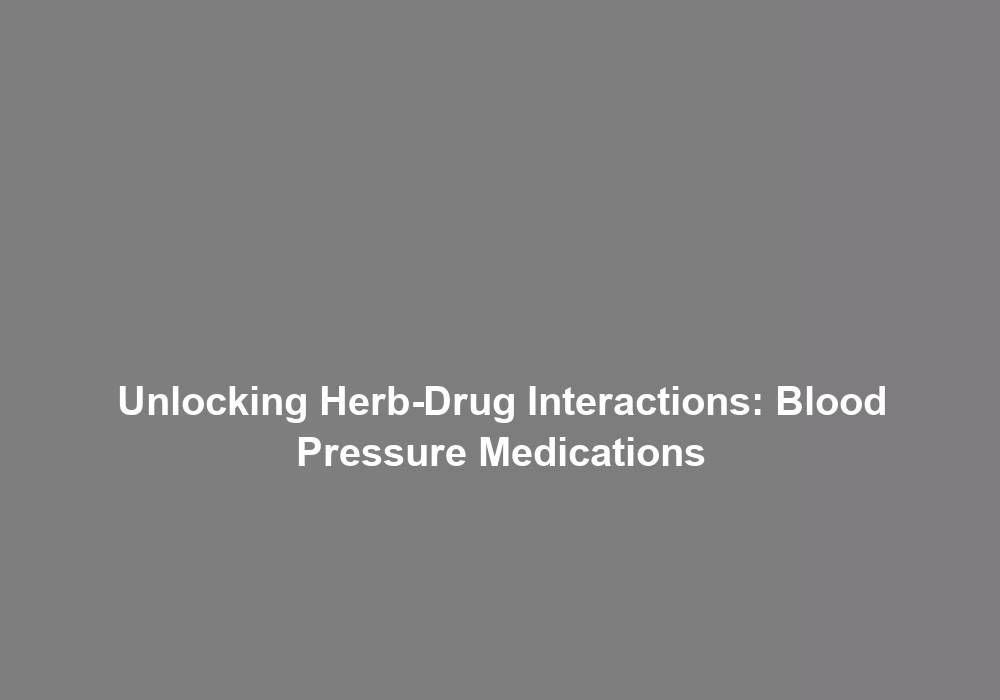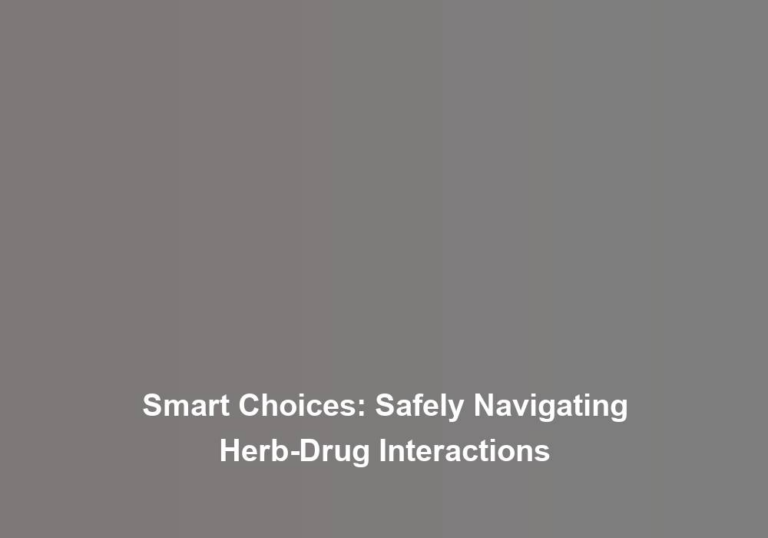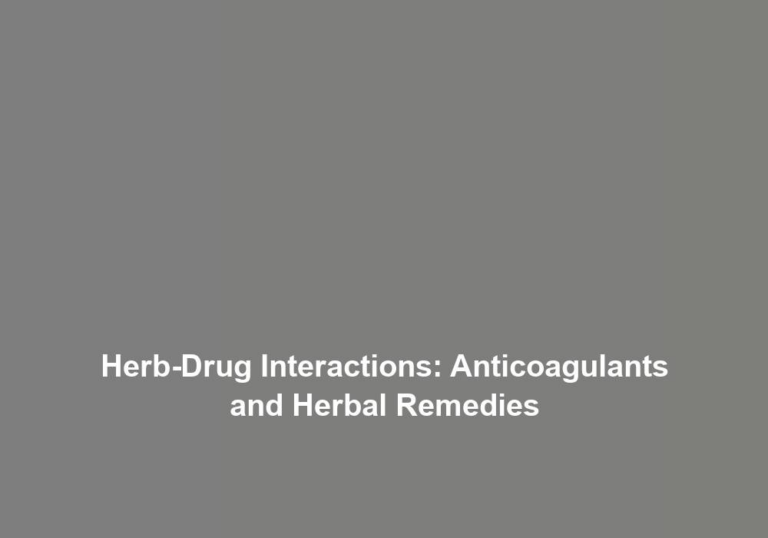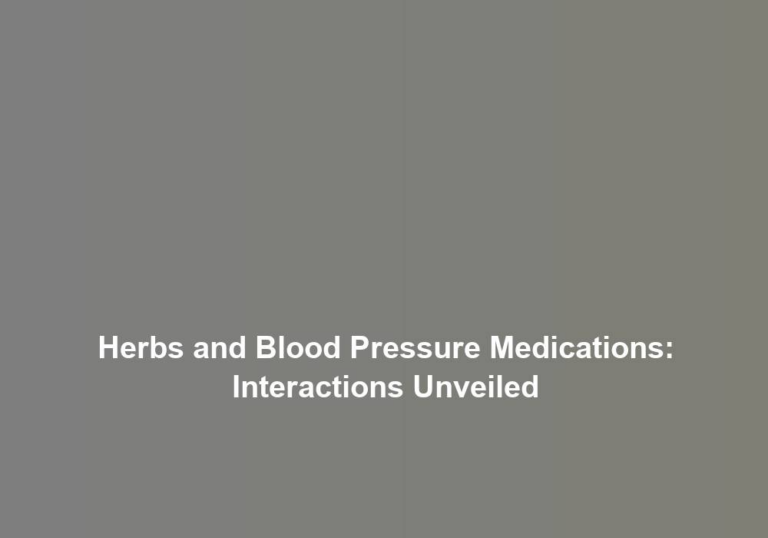Unlocking Herb-Drug Interactions: Blood Pressure Medications
Feeling the pressure to manage your blood pressure medication while also wanting to explore the potential benefits of herbal remedies? ItG??s important to understand the potential interactions between herbs and blood pressure medications to ensure your safety and well-being. While some herbs may offer complementary support, they can also pose risks when combined with certain medications. In this discussion, weG??ll explore common interactions, potential risks, and strategies for safely navigating the world of herb-drug interactions, providing you with the knowledge you need to make informed decisions about your health.
Understanding Herb-Drug Interactions
Understanding herb-drug interactions is crucial for individuals using both herbal supplements and prescription medications to manage their health conditions. Herb-drug interactions occur when herbal remedies and prescription medications interact with each other, potentially leading to complications and affecting the effectiveness of the medications. It is essential to be aware of these interactions to ensure the safe and effective management of health conditions.
When herbal supplements are taken alongside prescription medications, there is a potential for interactions that can impact the bodyG??s ability to metabolize the medications. Some herbal supplements can interfere with the enzymes responsible for metabolizing medications, leading to either increased or decreased levels of the drugs in the body. This can result in reduced medication effectiveness or increased risk of side effects.
Moreover, certain herbal supplements may have blood pressure-lowering effects, which can be concerning for individuals taking blood pressure medications. For example, supplements like garlic, hawthorn, and ginseng have been associated with blood pressure-lowering effects, and when combined with blood pressure medications, they can lead to excessively low blood pressure, posing a risk to the individualG??s health.
Understanding herb-drug interactions empowers individuals to make informed decisions about their healthcare. It is important to consult healthcare providers before incorporating herbal supplements into a medication regimen, as they can provide guidance on potential interactions and help individuals navigate the complex landscape of managing health conditions with both herbal remedies and prescription medications.
Common Herbs and Blood Pressure Medications
When considering common herbs and blood pressure medications, it is important to recognize potential interactions that may impact their effectiveness. Herb selection plays a crucial role in the management of blood pressure, as some herbs have been found to interact with certain blood pressure medications. For instance, herbs such as ginseng, hawthorn, and licorice may alter the effects of blood pressure medications, leading to potential risks or reduced health benefits. It is essential to be mindful of the potential risks associated with herb-drug interactions, as they can affect the efficacy of blood pressure medications.
Additionally, the dosage of blood pressure medications can be affected by the concurrent use of certain herbs. Some herbs, when taken in combination with blood pressure medications, may either potentiate or inhibit the effects of the medications. This can lead to fluctuations in blood pressure levels, making it crucial to carefully monitor the dosage of blood pressure medications when combined with herbs.
Understanding the potential interactions between common herbs and blood pressure medications is vital for individuals seeking to manage their blood pressure effectively. It is recommended to consult with healthcare professionals before incorporating herbs into your treatment regimen. By doing so, you can ensure that the combination of herbs and blood pressure medications is safe and does not compromise the intended therapeutic effects of the medications.
Risks and Impacts of Interactions
To properly manage your blood pressure, it is crucial to be aware of the potential risks and impacts associated with interactions between common herbs and blood pressure medications, as they can significantly affect the effectiveness of your treatment. Understanding the potential dangers and health implications of these interactions is essential for making informed decisions about your health.
-
Altered Blood Pressure Control: Herb-drug interactions can lead to fluctuations in blood pressure control, resulting in unanticipated high or low blood pressure levels. This can pose significant risks to your overall health and well-being.
-
Reduced Medication Efficacy: Interactions between herbs and blood pressure medications may reduce the efficacy of your prescribed medications, leading to inadequate management of blood pressure and increasing the risk of complications associated with hypertension.
-
Adverse Side Effects: Herb-drug interactions can potentially lead to adverse side effects, compromising your health and quality of life. These side effects may include dizziness, nausea, headaches, and other symptoms that can impact your daily activities and overall sense of well-being.
Being mindful of these risks and impacts can empower you to have informed discussions with your healthcare provider regarding the use of herbs and blood pressure medications. It is essential to communicate openly about any herbs, supplements, or alternative treatments you are using to ensure the safe and effective management of your blood pressure. Your active participation in this dialogue is crucial for achieving optimal health outcomes and minimizing potential risks associated with interactions between herbs and blood pressure medications.
Strategies for Safe Herb-Drug Use
Utilizing safe practices when combining herbs and prescribed blood pressure medications is crucial for maintaining optimal health outcomes and minimizing potential risks. When considering herb-drug interactions, itG??s essential to approach the combination with caution. Proper herb selection and dosage considerations are vital to ensure the safe use of herbs alongside blood pressure medications. Additionally, understanding potential side effects and establishing monitoring protocols can help mitigate any adverse reactions.
| Herb Selection | Dosage Considerations |
|---|---|
| Consult a healthcare professional before starting any herbal supplement. | Start with a low dosage and monitor for any changes in blood pressure or medication effectiveness. |
| Choose herbs with known safety profiles and minimal interactions with blood pressure medications. | Gradually adjust the dosage under the supervision of a healthcare provider to determine the optimal balance between the herb and the prescribed medication. |
When selecting herbs to complement blood pressure medications, itG??s crucial to seek guidance from a healthcare professional to ensure compatibility and safety. Additionally, starting with a low dosage and carefully monitoring any changes in blood pressure or medication effectiveness can help identify any potential issues early on. Gradually adjusting the dosage under the supervision of a healthcare provider allows for the fine-tuning of the herb-drug combination. By taking these measures, you can actively participate in managing your health while minimizing the risks associated with herb-drug interactions.
Consultation and Monitoring for Safety
Ensuring the safety of combining herbs and prescribed blood pressure medications requires consultation with a healthcare professional and diligent monitoring for any potential interactions or adverse effects. Consultation with a healthcare professional is essential for a safe and effective integration of herbs with blood pressure medications. Here are key aspects to consider for consultation and monitoring:
-
Healthcare Professional Involvement: Seek guidance from your healthcare provider, as they can provide personalized advice based on your medical history, current medications, and specific herb choices. Discussing herb use with your healthcare professional ensures that they can monitor your blood pressure medicationG??s effectiveness and adjust dosage if necessary.
-
Regular Monitoring: It is crucial to monitor your blood pressure regularly, especially when incorporating herbs into your treatment regimen. Keep track of your blood pressure readings at home and share the results with your healthcare provider. This monitoring allows for early detection of any potential changes in blood pressure control that may be linked to herb-drug interactions.
-
Potential Side Effects: Stay vigilant for any unusual symptoms or side effects that may arise after combining herbs with your prescribed blood pressure medications. Report any unexpected changes in your health to your healthcare provider promptly, as they can assess and address any potential issues.
Conclusion
In conclusion, itG??s important to be aware of potential herb-drug interactions, especially when it comes to blood pressure medications. By understanding the risks and impacts of these interactions, you can take steps to ensure safe herb-drug use. Consultation with a healthcare professional and regular monitoring can help you navigate potential interactions and make informed decisions about your health. Remember, knowledge is power when it comes to managing your medication and herbal supplement regimen.






